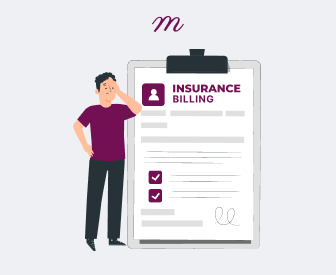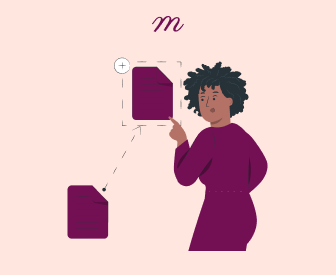Have your progress notes written for you automatically
Having your own private practice comes with the freedom of setting your work schedules and pay rates. However, many therapists struggle to find the balance between personal income and company growth.
Do you wonder how to pay yourself while managing administrative tasks, cash flow, and tax obligations? This guide will help you identify the best ways to pay yourself in private practice. You’ll also know how to choose a salary amount that will fund your desired lifestyle while building a profitable practice.
Types of Payment Methods in Private Practice
There are two different methods to pay yourself as a mental health practitioner in a private practice.
1. Salary Payment: This is a fixed, regular amount that can be set at intervals (weekly, bi-weekly, monthly) just like any employee. It is common with private practices that have their structure as S Corporations. As a therapist, you can decide which one best suits your needs. This means that taxes such as federal or state income tax, social security tax, and Medicare tax will be withheld from your salary the instant you are paid. 2. 3. Owner’s Draw: This is very flexible. You can set it at an interval of your choice and pay yourself based on your business’s profit. This payment type is more common among solopreneurs. Taxes are not automatically deducted from the owner's draw. Rather, you will be responsible for paying taxes based on the income you receive. 4.
The following are ways to accept payment through the owner's draw from your private practice’s income. You can:
Write a cheque
Withdraw cash from a bank account
Send an e-transfer to your account
Accept credit cards and debit cards
Schedule a recurring bank transfer to your account
Choosing The Right Business Structure To Pay Yourself in Private Practice
When you start a private practice, it is vital to consider which business structure is best for you. The exact method of paying yourself depends on the business structure of your choice. You can decide if your practice will be a sole proprietorship, LLC, or S corporation.
Sole Proprietorship
This means that you own your private practice and have full control over its operations. As a mental health practitioner, you get paid as a sole proprietor by taking draws from the profit you make. You will need to pay state and federal income taxes on all your profits. You will also have to pay a self-employment tax. To pay yourself as a sole proprietor, you need to have a comprehensive understanding of your business's expected income, your living expenses, and your tax obligations.
To make good financial decisions as a solopreneur, you need to record your owner’s draw in your practice’s general ledger. It is usually best to keep detailed and careful records of your practice’s finances. This is a record of your company’s transactions over some time. It is also needed to prepare a financial report for your company.
Sole Proprietorship is very easy to start. There’s no need to register with the state. All you need is a license or permit that your state or local government requires. You have autonomy over all the decisions you want to make for your private practice. It requires less paperwork and you don’t have to keep documentation to maintain your business’s legal status. You are entitled to all your business profits.
However, an important thing to note is that taxes for sole proprietorships are higher. You are to pay income taxes and self-employment taxes on the entire amount of your practice’s revenue. That might be a huge amount of money if your company is booming and profitable. As a solopreneur, all the debts and liabilities of your company are your responsibility. You also need to prepare for marketing, finances, management, and operations. This could easily lead to stress and burnout.
Limited Liability Company
This is a business structure that protects people from personal liability for the debts and losses of the company. If you have more than one member or owner, you will be taxed based on the partnership. The default way to get taxed is as a sole member. But, if you choose to be taxed as a corporation, the other members will be considered to be employees and receive a salary.
As a sole member, you can take advantage of both salary and owner's draws for more flexibility in managing your income and taxes. Limited Liability Companies usually have fewer requirements for their management structure and administrative tasks.
When you take out your share of the profits through the owner's draws, it comes out of the business profits after taxes are paid. This is important so they don't affect the LLC's tax bill. Your private practice will not pay taxes on its income. So, you don't need to be concerned about your assets because they are protected from lawsuits and the company's debt.
One of the drawbacks of limited liability companies is that it costs more to form and maintain than other business structures. Single members can find it difficult to get investors. The investor will be taxed on your practice’s profits even though he does not receive cash distribution personally.
S Corporation
This type of business structure integrates components from partnerships and corporations. To prevent double taxation on corporate income, it allows business income, losses, credits, and deductions to pass through to the shareholders' tax returns. Additionally, S Corporations must file a federal tax return (Form 1120S) even though they don't pay income tax themselves. This informs the Internal Revenue Service (IRS) about the corporation's activity and allows the income to be properly allocated to the shareholders.
There are two ways to pay yourself as an S Corporation. You can either pay yourself with a salary, a distribution, or both. S Corporation allows you to get additional profit as distributions. If you are a shareholder and not a shareholder-employee, you are paid with a distribution. As a therapist, you are paid a salary for your services on behalf of the S Corporation. You are one of those who invested their capital in the S Corp. This means you are not involved in the daily operations of the private practice.
It's important to ensure that distributions are made based on the S Corp's profits and don't negatively impact the financial health of your private practice. You should ensure to calculate your stock and debt basis to avoid owing extra taxes on distributions. It is possible to get your tax return but it is more expensive. Employment taxes will be removed from your salary and remitted to the Internal Revenue Service (IRS). But, you won't have to deal with the business debts or the lawsuits. Your personal assets are usually protected.
An S Corp enhances your professional image and offers more flexibility. But one of the drawbacks is that it is complicated to close down. If it is a temporary side job to get extra income, this method to pay yourself might not be most suitable. This is because you will have to close your payroll accounts and dispose of assets in the S Corp that can trigger taxes.
Each structure has an effect on your practice’s finances, legal obligations, and taxes. To ensure you make a profit and successfully run your private practice, speak to a financial or legal expert. You must be aware of the rules that apply to each business structure.
What is The Right Amount to Pay Myself from My Private Practice?
Your practice’s income is a major factor to consider when you want to pay yourself. Private practice owners pay themselves a percentage of their entire revenue. There are some other factors to consider when determining what percentage to pay yourself from your private practice. They include:
How many hours do I want to work in a week?
Will I handle all the therapy sessions myself, or will I hire additional staff?
Will I continue to be the owner or have a partnership?
How many other people do I want to hire?
How much is my entire revenue?
How much would I pay for rent, insurance, and tax savings?
What are my expenses?
What are my practice tax obligations?
Additional factors to consider:
What are your financial goals? (Are you prioritizing maximizing income, saving for retirement, or achieving a work-life balance?)
Have you researched the typical therapist salaries in your area?
Do you have a system for tracking your rent, insurance, taxes, and other business costs?
How effectively are you handling billing for your services?
Do you meticulously record your income and expenses?
Have you considered consulting with a tax professional? (They can help you choose the right compensation strategy to minimize your tax burden.)
All these should be put into consideration when you are determining the right amount to pay yourself. Remember, there's is no one-size-fits-all answer. The right amount to pay yourself depends on your specific circumstances and goals. By considering all these factors, you can determine the best compensation strategy for your private practice.
Things to Consider in Private Practice Accounting
Separate Finances
You should have separate bank accounts for your personal and practice income. To avoid mistakes, the income you earn as a therapist and your expenses should not be handled in the same account. All the income you earn as a therapist in your private practice should be in your business account. This will make bookkeeping or recording of your finances very easy.
Bookkeeping Considerations
Careful record-keeping of all income and business expenses is essential for your private practice. You need to maintain accurate financial records of your income statement, balance sheet, and cash flow statement of your practice. Also, ensure that the accounting policies are followed. This record-keeping becomes vital when calculating both taxes and how much to pay yourself as a private practice owner.
You can make use of bookkeeping tools to manage your finances and the money coming in and out of your practice. Understanding this will help you calculate how much you will owe in taxes at the end of the year. As a therapist, you can save costs in your practice by using psychotherapy notes software like Mentalyc. There are also other billing practice management tools you can explore.
Taxes to Pay
As a therapist who owns a private practice, you are responsible for self-employment taxes, social security taxes, and income tax. If you own the building where your practice is located, you are to pay property taxes as well. You can prevent the accumulation of taxes at the end of the year by putting aside money for these taxes throughout the year. At this level, budgeting is essential for smooth financial management. Keeping a record of receipts for your expenses is also crucial for tax filing and deductions.
Conclusion
As a mental health professional, financial planning is key for setting up your private practice for sustainable growth. This guide has shown you the different methods to get paid and provided knowledge on how to pay yourself based on your chosen business structure.
The decision to pay yourself affects the financial stability of your practice depending on how much or often you receive payment. Secure your financial future by consulting a financial advisor specializing in private practices. Financial management is key to running a thriving private practice. When done effectively, you can build a successful practice while enjoying the income from your profitable practice.
Frequently Asked Questions
What is the Typical Salary of a Practice Owner?
According to the May 2020 National Occupational Employment and Wage Estimates in the United States, the average therapist's yearly salary ranges from $34,000 to $96,000. However, the amount you get paid still depends on the total revenue of your practice in a year.
Are There Any Legal Regulations When I Pay Myself in Private Practice?
Yes, there are specific legal rules and regulations in your country concerning salary payments for therapists. You’ll need to comply with them while keeping your professional private practice requirements in mind.
Do I Pay Property Tax for the Building I Rented for My Practice?
No, you cannot pay property tax as a tenant. The owner of the building is responsible for the payment of property tax to the government.
What's the Difference Between a Partnership and a Limited Liability Company?
A partnership doesn't have any separate legal entity from its partners, unlike a Limited Liability Company. This means the partners themselves are personally liable for the business's debts and obligations. While the extent of liability might be shared differently based on the partnership agreement, personal assets are generally not protected from lawsuits or debts of the business. An LLC separates the business assets of the company from the personal assets of the members. This provides protection from lawsuits and the company's debts to the members.










